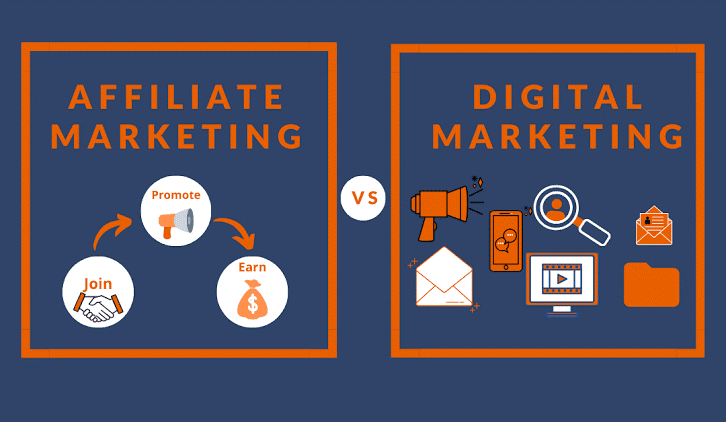Digital marketing and affiliate marketing are two common strategies, each with distinct goals and methods. Businesses can use a variety of strategies in the current digital environment to connect with new clients and increase revenue.

Digital marketing: All marketing efforts that use the internet or electronic devices. It encompasses a wide range of internet marketing initiatives meant to advertise goods and services.
Affiliate Marketing : Is a results-driven marketing approach where an individual or company receives a commission for advertising and promoting the products or services of another business. Affiliates earn compensation depending on the specified action, such as making a sale, generating a lead, or getting a click.
Although it is a component of digital marketing, affiliate marketing is not the same as digital marketing. To help you understand their relationship and differences, below is a thorough comparison:
Digital Marketing and How it works
- EO (Search Engine Optimization): Optimizing content to rank higher in search engine results.
- Content Marketing: Creating and sharing valuable content to attract and engage an audience.
- Social Media Marketing: Using platforms like Facebook, Instagram, and LinkedIn to promote products.
- Email Marketing: Sending targeted emails to prospects and customers.
- PPC (Pay-Per-Click) Advertising: Paying for ads that appear on search engines and other platforms.
- Influencer Marketing: Collaborating with influencers to reach their followers.
- Affiliate Marketing: Using affiliates to promote products (one of the many strategies).
How Digital marketers earn
- Identify target audience and choose appropriate digital channels.
- Develop marketing strategies tailored to each channel (SEO, content, social media, etc.).
- Execute campaigns across chosen digital platforms.
- Monitor and analyze performance metrics to optimize efforts.
Affiliate Marketing and How it works
- Affiliates: People or organizations that advertise a company’s goods or services.
- Commission: Revenue determined on performance indicators like leads, clicks, or sale
- Tracking: Keeping an eye on traffic and conversions brought about by affiliates.
How affiliates earn
- Affiliates obtain special tracking links after registering for a program.
- Affiliates use email, blogs, social media and other platforms to advertise the company’s goods and services.
- The distinctive links are used to track sales and leads.
- A commission is paid to affiliates for the leads or sales they bring in.
Similarities between Affiliate Marketing and Digital Marketing
- Complementarity: Both can be combined to accomplish more comprehensive marketing objectives. For instance, a company may utilize affiliate marketing to reach new markets in addition to using SEO and PPC to bring direct traffic to its website.
- Integration: Affiliate marketing is integrated into digital marketing strategies as one of the many tools used to drive traffic and sales.
Differences between Affiliate Marketing and Digital Marketing
- Scope: Affiliate marketing is a kind of digital marketing that specializes in collaborations that are based on performance.
Digital Marketing: All forms of online marketing, including affiliate marketing. - Focus: Affiliate marketing: Places a focus on working together with affiliates to increase traffic and revenue.
Digital marketing is the study of a wider variety of online business growth and promotion techniques. - Model of Payment: Affiliate marketing: Paying out commissions on leads or sales, usually depending on performance.
Digital marketing: May entail set budgets, cost-per-impression, and cost-per-click, among other payment schemes. - Control: Affiliate Marketing: Limited control over affiliates’ methods and strategies. Digital Marketing: More control over marketing tactics and messaging across different channels.
